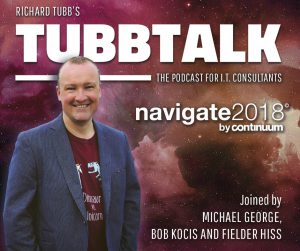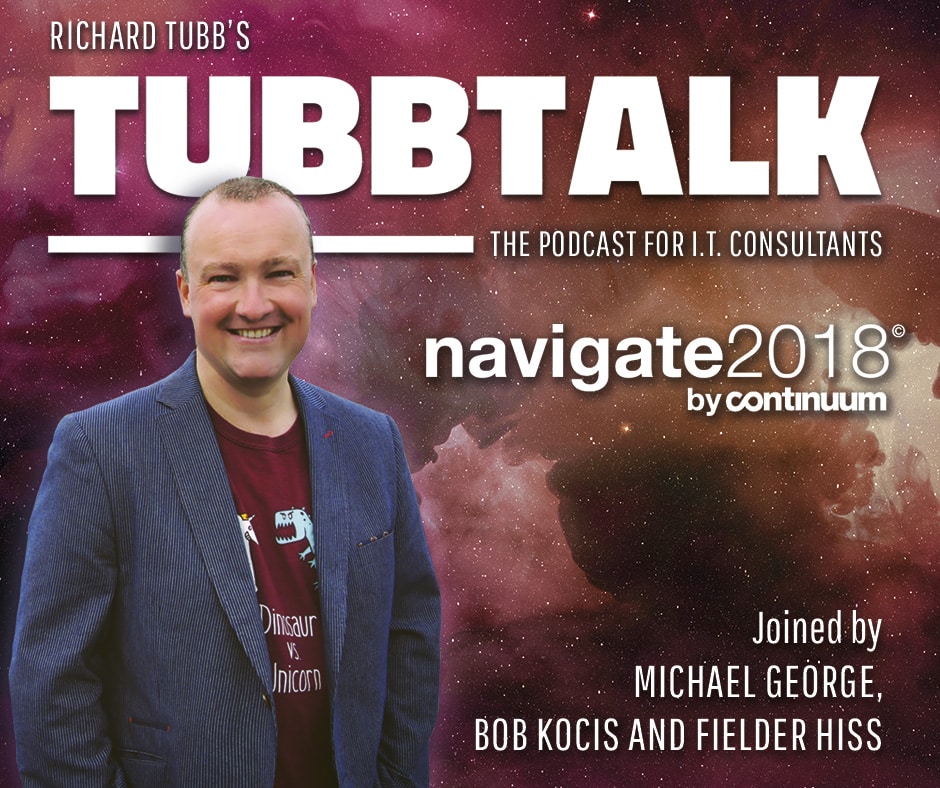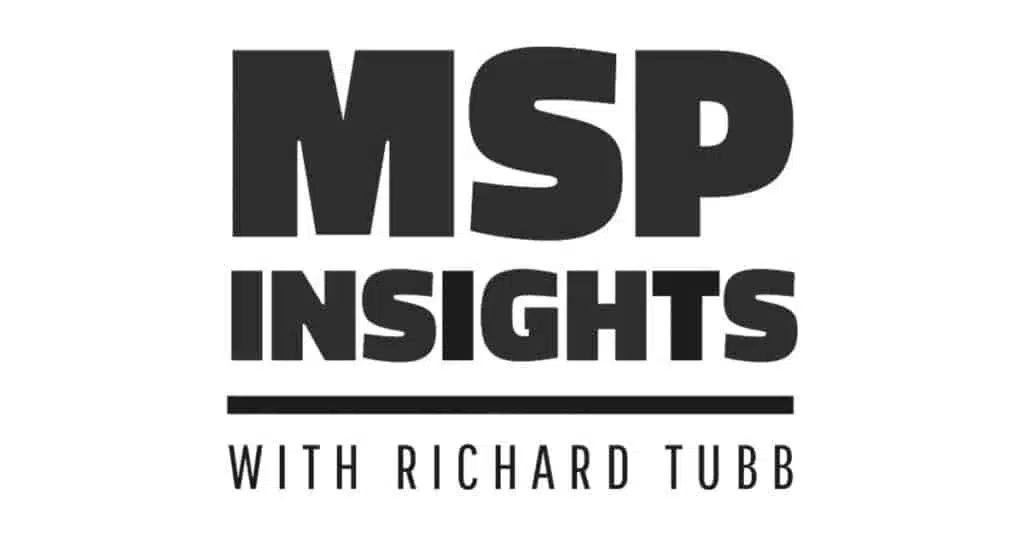In this episode, Richard talks to Continuum’s Executive Board: CEO Michael George, CRO Bob Kocis and VP of Product Fielder Hiss, about what’s next for the business, the importance of security and why MSPs need to pivot in order to grow.
An Interview with Continuum’s Executive Board
In September, Continuum hosted their annual Navigate conference in Boston, USA. Richard took the opportunity to speak to Michael George, the CEO, Bob Kocis, the CRO and Fielder Hiss, Vice President of Product, to find out more about what’s coming next for the company and the trends and developments that MSPs (managed service providers) need to be aware of in the industry.
Who is Continuum?
Continuum support almost 6,000 MSP clients around the world, providing a white label helpdesk and content, training courses and a range of software solutions, including NOC (network operations centre), BDR (backup disaster recovery) and RMM (remote monitoring and management).
The solutions they offer are aimed at giving smaller businesses the same level of support as their larger competitors, with a model which is scalable to allow IT business owners to grow and provide a bigger range of services to their clients without having to take on additional staff too soon.
What MSPs can Take Away From Navigate
Bob Kocis says that MSPs who are engaged with Continuum have a ‘first mover advantage’ – their needs are understood and supported. Their recent acquisition of Carvir was designed to give MSPs a full security portfolio with minimal investment.
He acknowledged that it’s a difficult thing to build a security operation centre or even hire experts in that field, so Continuum is helping MSPs by giving them the competency to them, along with the technology and processes to offer security to their customers.
Continuum’s users see rapid business growth, and their employees work on higher-value-added tasks, offering strategic consulting, developing new business opportunities and helping the company to pivot as appropriate.
What is an MSSP?
A managed service security provider (MSSP) focuses on security rather than the work that an MSP traditionally does. MSSPs often work for companies which have an IT department but no security expertise.
MSSPs are very specialist, but Bob says it’s vital for MSPs to also be MSSPs. because a small business doesn’t want to go to two suppliers, giving the MSP an opportunity to help them. The terms MSP and MSSP will merge and the ideal situation is for a company to be able to provide both services to SMB clients.
How Continuum can Support Company Mergers
Mergers often mean that individual companies are bringing in their own tools. Fielder Hiss says there’s a lot of consolidation going on in the market, so it’s important for Continuum to help MSPs with that, and their tools are designed to accommodate that.
Their platform has tools that can help people migrate thousands of endpoints from on RMM to another in a matter of days. Continuum can also migrate legacy snapshots from pre-existing backup and disaster recovery applications. They want to be the tool of choice and deliver the most value to MSPs who are merging, to ensure that they have the right platform and support and to make the transition seamless.
Continuum is working to bring together their tools to create and an integrated service delivery platform, which Fielder thinks is really important, particularly for the MSPs’ clients – their priority is that their IT is up and running, secure and that they’re meeting their compliance standards. Continuum offers a range of solutions to help with client needs.
What is a SOC?
A security operations centre (SOC) is analogous to a NOC, says Fielder, but with a different skillset. He describes it as: “A centre or war room of trained security experts that are monitoring our tools, our MSPs and MSP clients’ environments for suspicious activity, using tools, technology and knowledge to determine what suspicious activity is malicious. And when malicious, mitigating and then remediating that activity, with a cybersecurity lens.”
Security expertise is really important but something that enterprises have struggled to hire, and put them in competition with the MSPs, who are also struggling. The Continuum SOC model allows some remediation through NOC and is designed to be a powerful tool for MSPs to offer.
Why Cybercrime is Becoming a Bigger Problem
Michael George believes the IT industry is at a very important crossroads that it needs to be paying attention to, and Continuum is working to make sure their partners are as prepared as possible to meet the challenges ahead.
Large enterprises and government systems have been the victims of cybercrime attacks in the last few years, forcing them to invest billions of dollars to protect their systems. This makes things harder for the cybercriminals, meaning that they’re now turning their attention to the small business market.
Cybercrime has become pervasive and utilises both simple and sophisticated techniques to attack smaller companies, who have focused more on acquiring technologies and becoming connected and less on security.
As criminals use ransomware to steal data, shut down systems and generally prevent a business from running, the owners are concerned that they’ll be attacked next. Michael says that MSPs haven’t responded to the risks quickly enough.
While the security they’ve been providing was sufficient in the past, the new levels of sophistication mean there’s now a need for isolation and remediation, which is essential.
Why Companies Need to Pivot in Order to Survive
In his keynote, Michael talked about the concept of digital Darwinism, and how the fast rate of change in today’s digital world means that companies need to evolve, adapt and change, not just to survive but to succeed. He talked about Xerox and Sharp, who both had success in the 1980s with the facsimile machine, with the former in the enterprise market and the latter in the small business market.
However, in the last two decades, Xerox has lost $100bn, which Michael attributes to their unwillingness to respond to technological developments and changing customer needs. Sharp, by contrast, reacted to these new things by pivoting and offering a wider range of services to their market. They now use Continuum’s platform to provide backup, remote monitoring and security.
He adds: “The rate of change in technology is hyper-speed compared to the industrial revolution. The digital revolution is taking place at astronomical rates, so the need to move quickly is an imperative.”
Mentioned in This Episode
- Bob’s article on Jocko Willink
- Continuum Acquires Managed Security Leader CARVIR
- Endpoint security software: SentinelOne
- Security Intelligence: EventTracker
- Microsoft Azure
- Amazon Web Services (AWS)
- Strategic support company Thoma Bravo
- Xerox
- Sharp
- Apple
- Microsoft
Interview Transcript
Transcript – TubbTalk 42 with Continuum Executive Board and Richard Tubb
Connect with me
- Subscribe to TubbTalk RSS feed
- Subscribe, rate and review TubbTalk in iTunes
- Subscribe, rate and review TubbTalk on Stitcher Radio
- Subscribe and rate TubbTalk on SoundCloud
- Subscribe and rate TubbTalk on Spotify
- Follow TubbTalk on iHeartRadio
- Follow @tubblog on Twitter















Comments